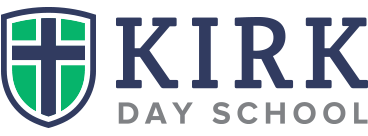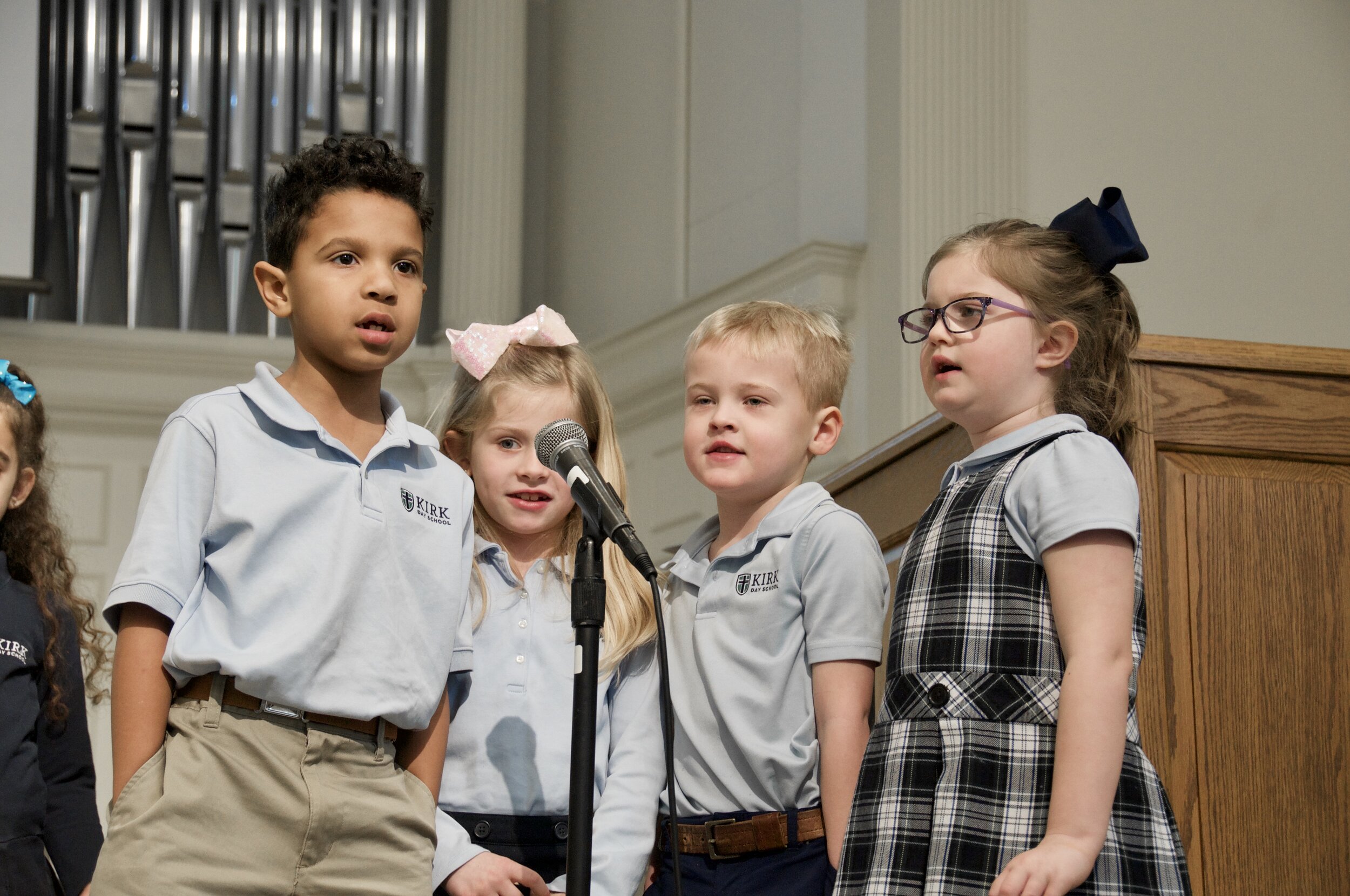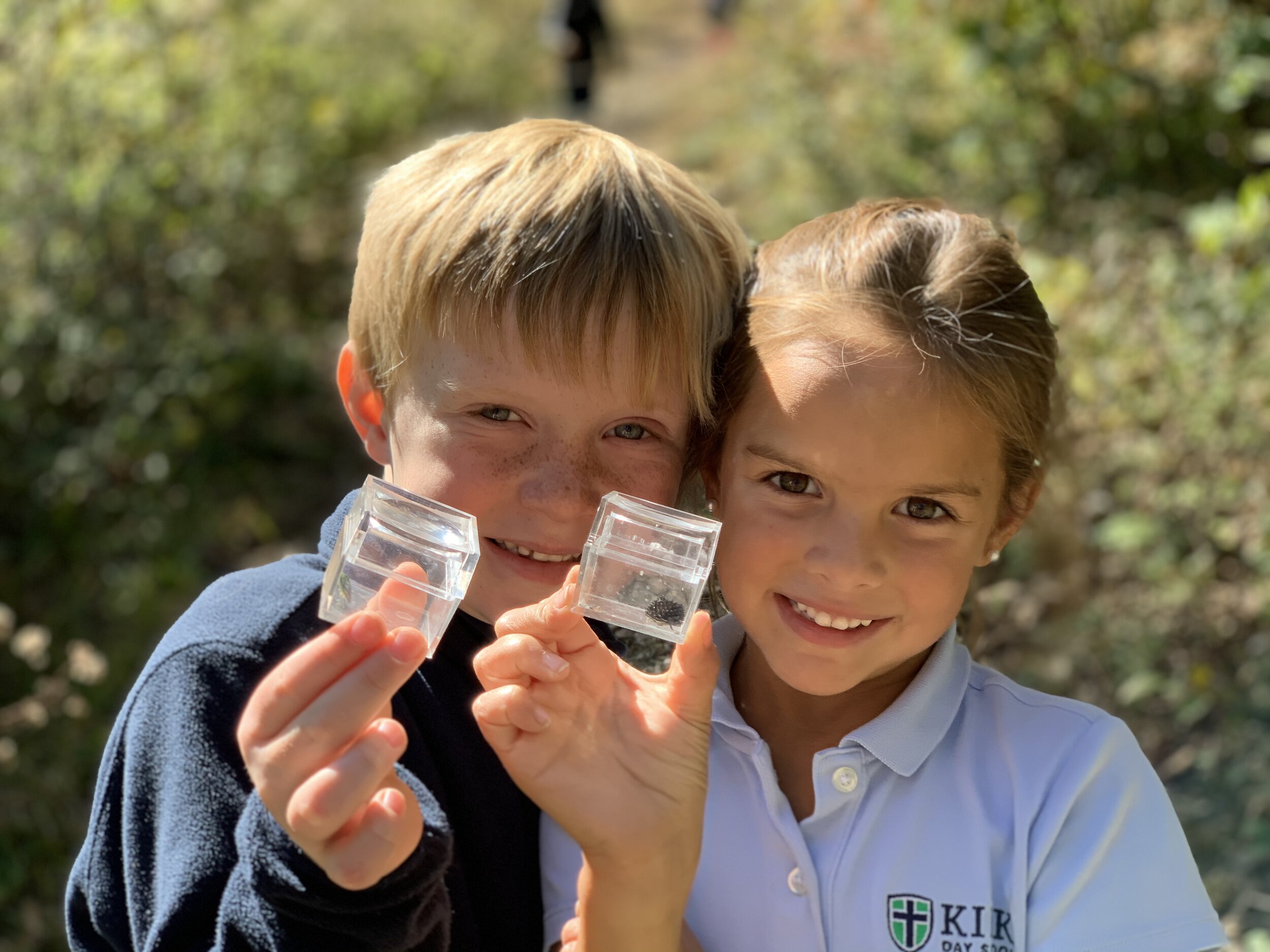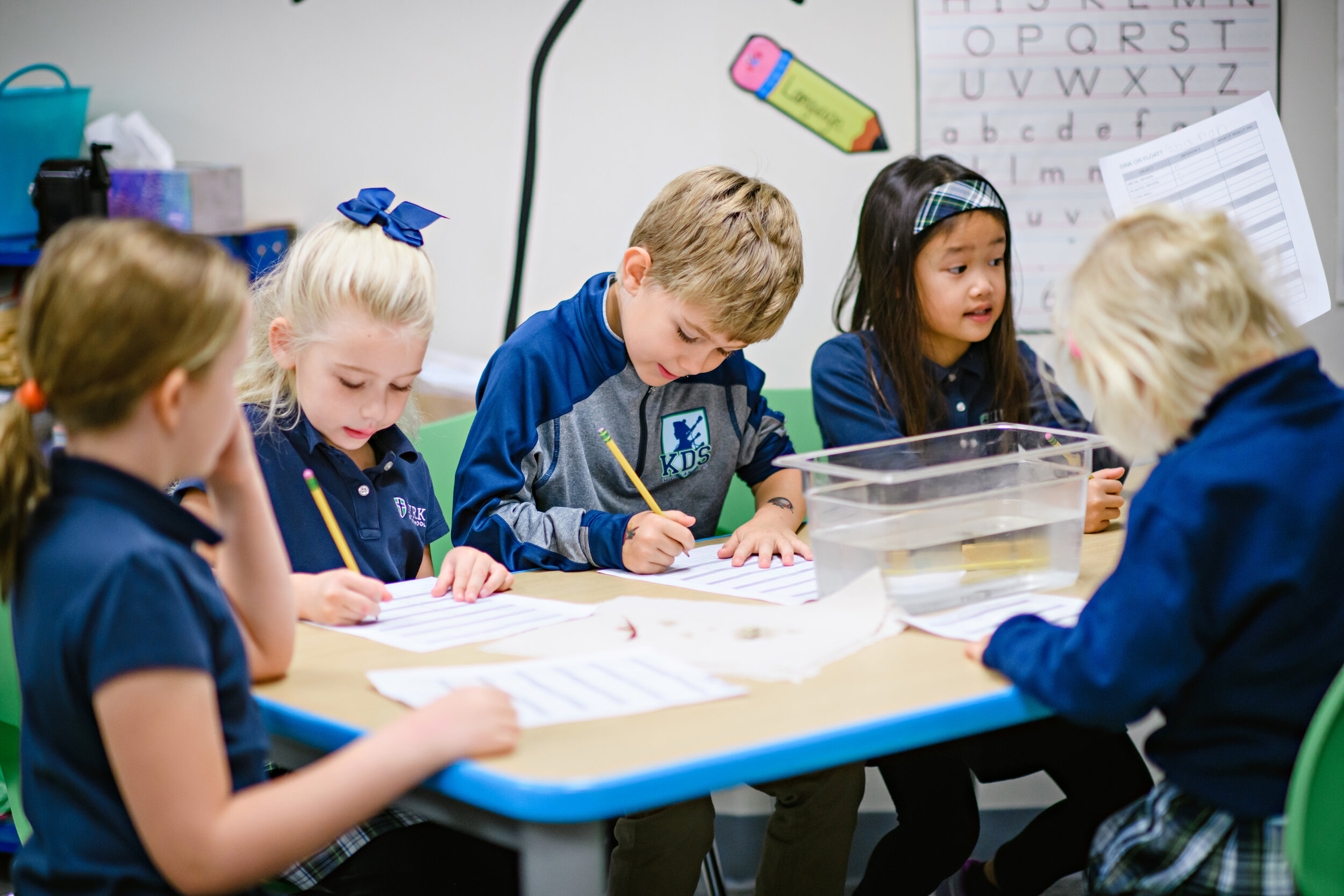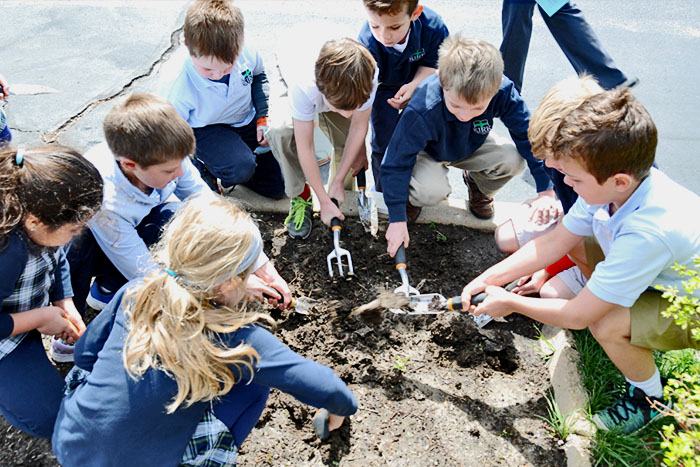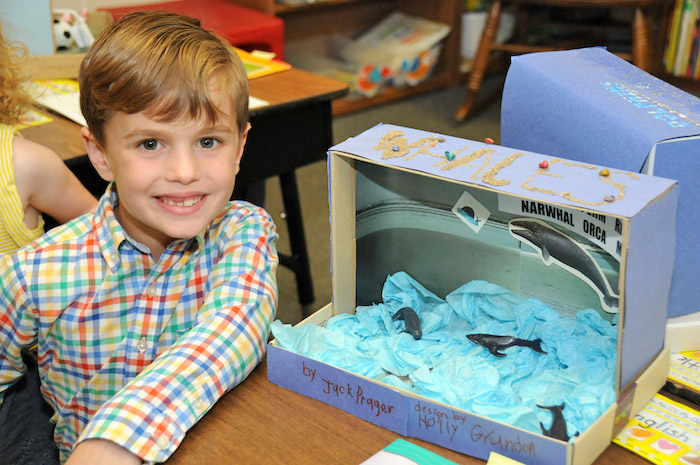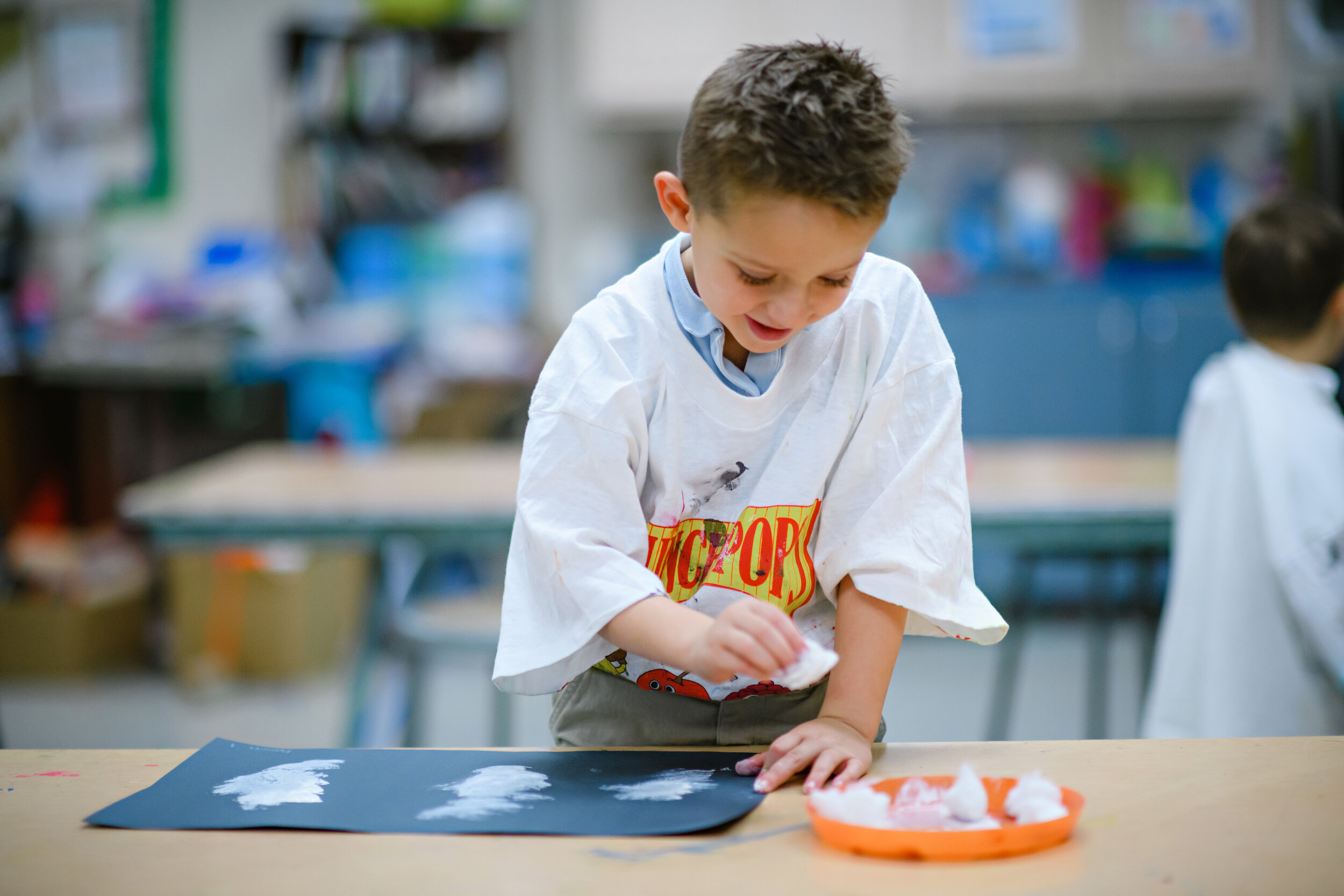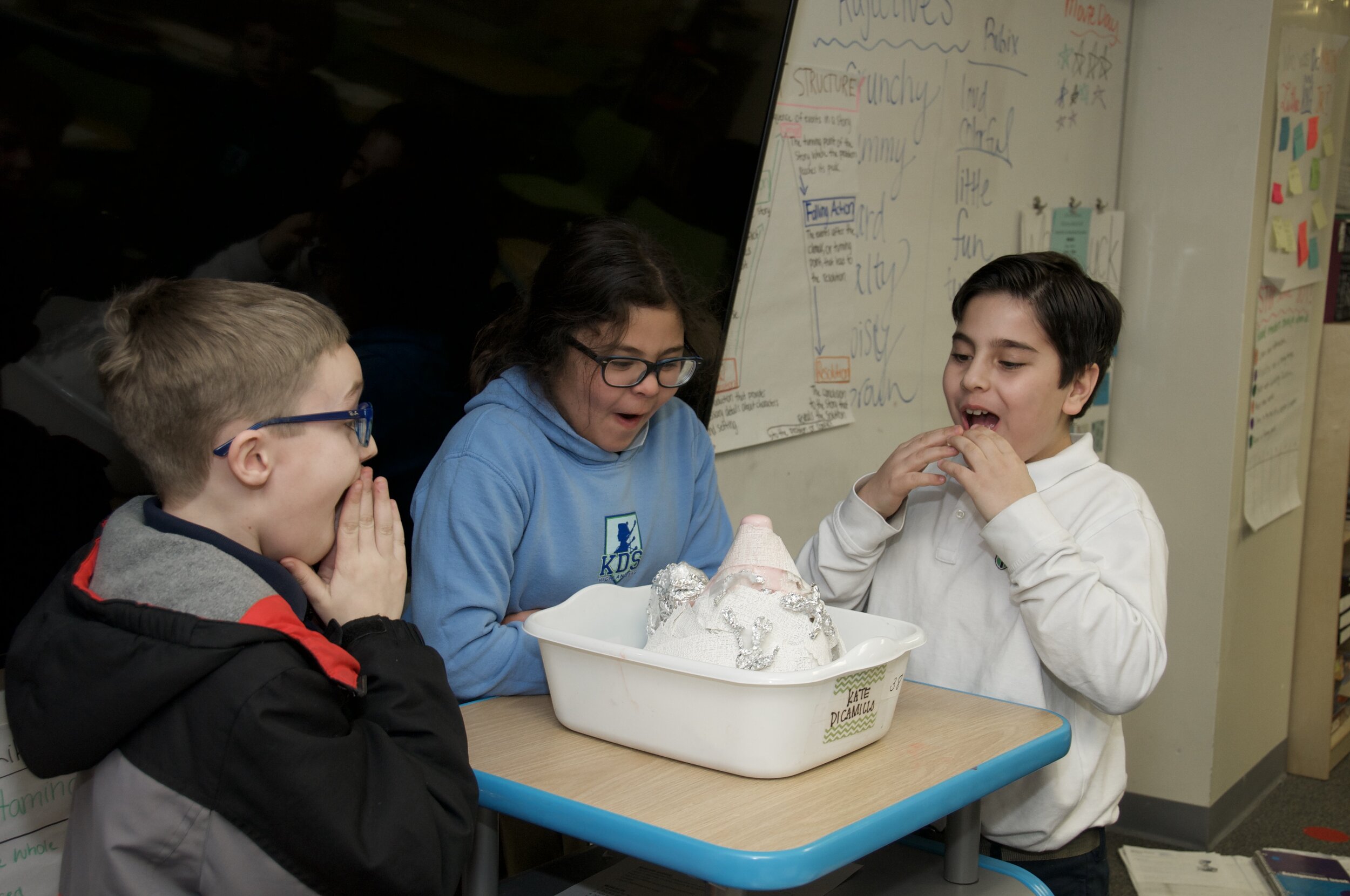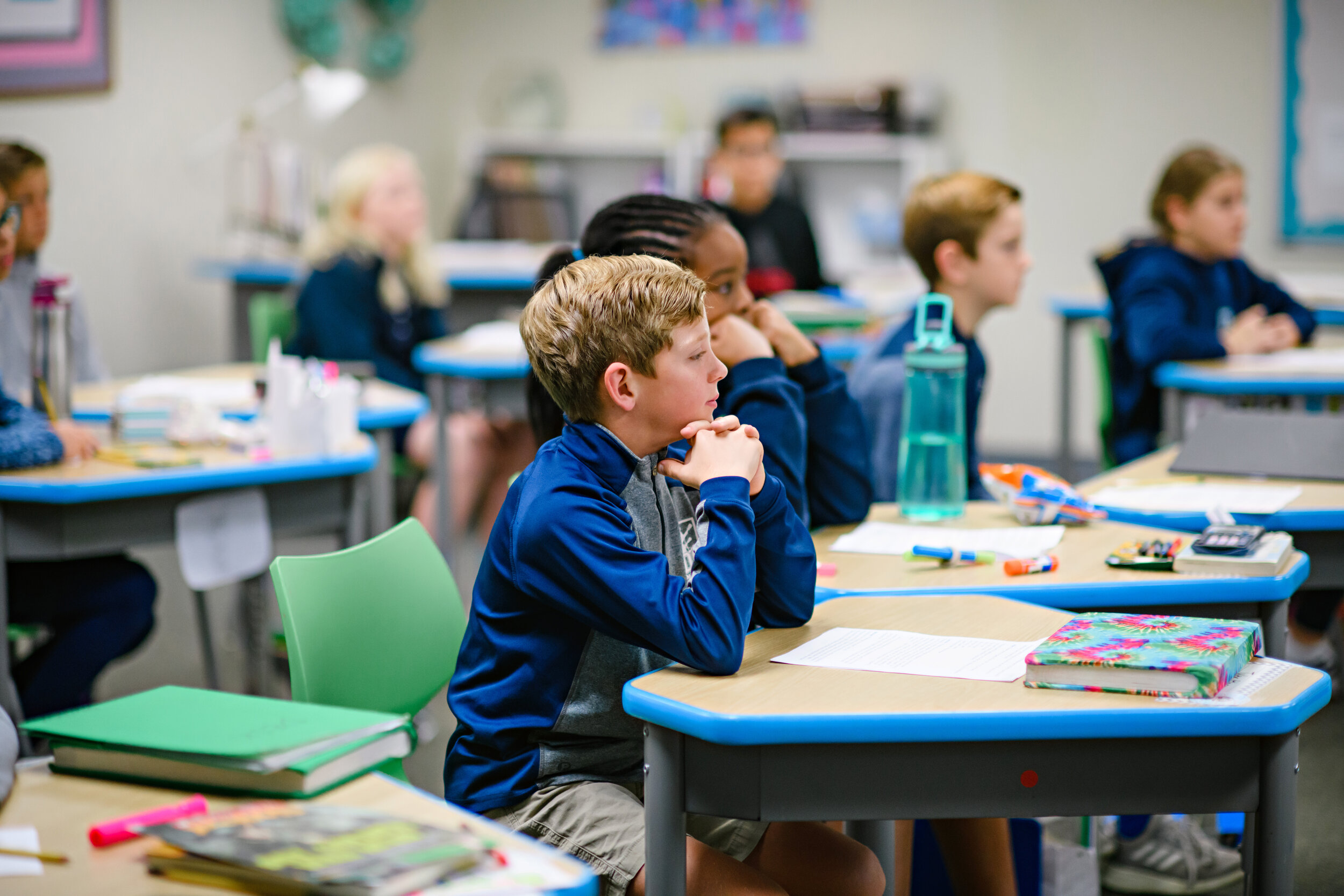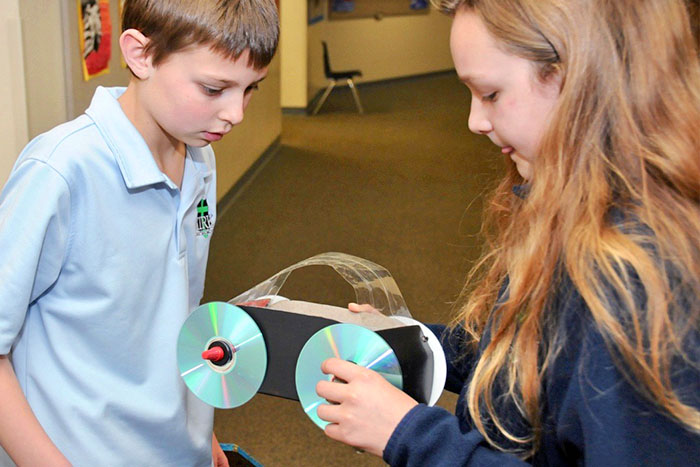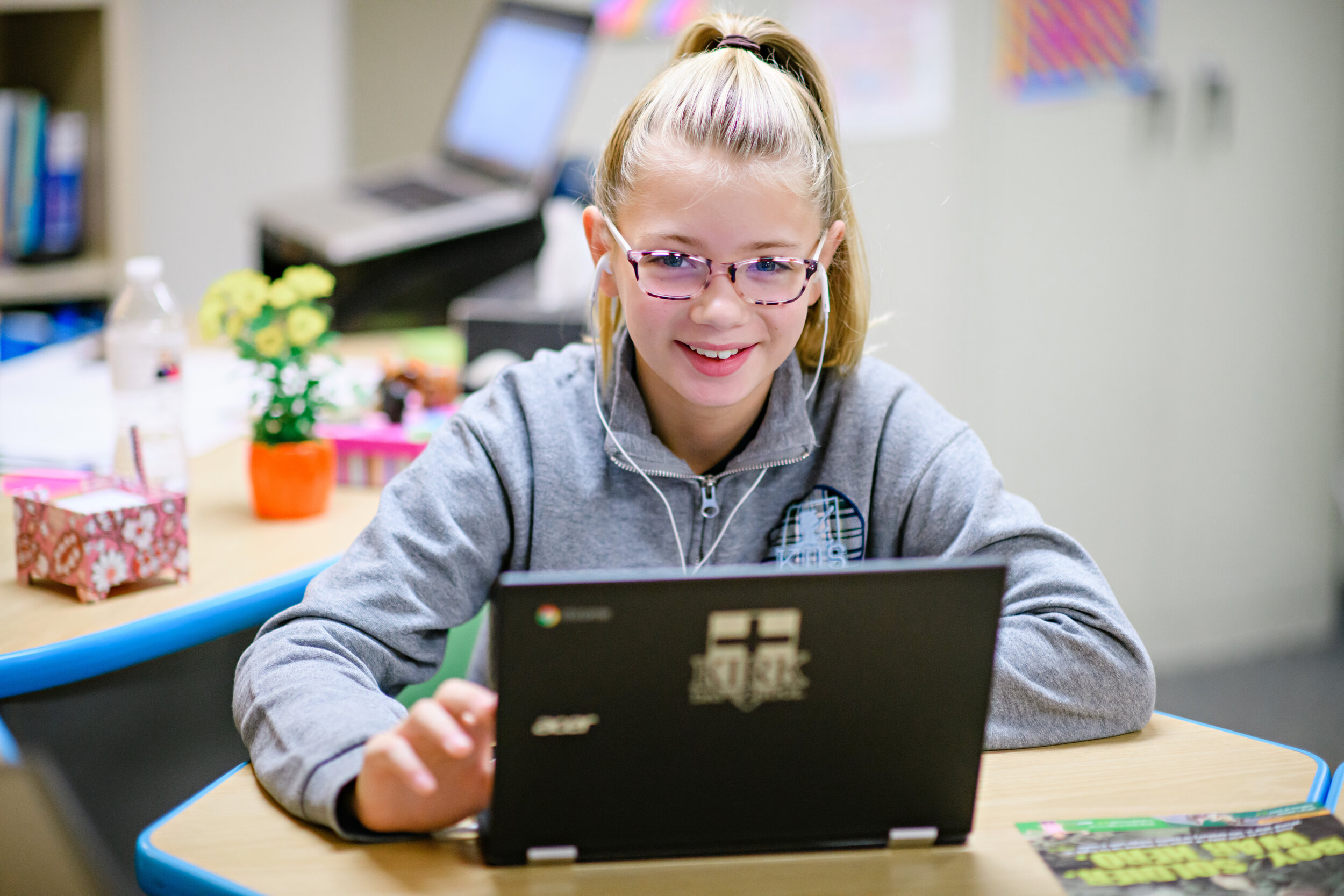
Educating for today, preparing for tomorrow.
At Kirk Day School, we are committed to strive for and maintain a rigorous educational program which nurtures the development of each child’s spiritual, physical, emotional, and intellectual needs.
A strong academic foundation is provided by classroom teachers who are passionate about teaching the Bible, reading, writing, math, history, and science. Their instruction is further enriched with classes in vocal and instrumental music, art, physical education, foreign language, and library skills. All subjects are purposefully framed in biblical truth and challenge students to use their God-given abilities to glorify Him.
First Grade
BIBLE
A study of biblical accounts from Creation through the Return from Exile is presented using the Walking with God and His People curriculum (Christian Schools International). Children are taught how to apply the biblical principles of peacemaking as presented in the Young Peacemaker program (Peacemaker Ministries) program. Weekly memorization and recitation of Bible verses are highlighted during the weekly chapel worship.
READING
Early reading skills are developed through systematic instruction in phonics, vocabulary and sight word development, and comprehension skills using the Open Court Reading program (McGraw-Hill). Additional practice is provided in reading orally and silently while developing comprehension skills and evaluating what has been read. Students’ skills are reinforced through a daily break for sustained silent reading (D.E.A.R. Time).
PROCESS WRITING
Recognizing the written word as communication, students begin to write multiple line compositions emphasizing complete sentences, correct punctuation, capitalization, word usage and parts of speech using the multisensory approach presented through Step Up to Writing (Voyager Sopris).
SPELLING
Phonetic skills and principles for early spelling are introduced and applied in learning to write high frequency vocabulary.
HANDWRITING
proper pencil grip and writing posture are emphasized, along with correct formation of manuscript letters and numerals 0 – 9 using Zaner-Bloser Handwriting.
ADDITIONAL LANGUAGE ART SKILLS
Opportunities are extended for developing skills in listening, poetry, and oral presentation
MATHEMATICS
Students develop the foundational skills to become proficient in key math skills and concepts at the first grade level using Progress in Mathematics (Sadlier). Opportunities are provided to introduce new concepts through the use of hands-on manipulatives and enhanced problem solving strategies. Lessons are reinforced through review and practice to develop mathematical fluency.
HISTORY
Students recognize, recall and respond to historical information presented in the context of a Biblical worldview. Topics of study include: ancient Bible stories; Columbus; Native Americans; Pilgrims; Presidents; American symbols; and Dr. Martin Luther King, Jr.; along with a brief look at selected countries and current events. Students work with maps and learn foundational terminology and concepts of geography as related to the historical topics. A variety of teaching resources are used including, History and Geography: Core Knowledge (Pearson), My America and My World (A Beka), Families and Neighbors (Scott Foresman), and Map Skills for Today (Scholastic).
SCIENCE
An introductory exploration of the natural sciences applies early skills in scientific investigation and reported findings. Topics include: living/nonliving; plants and animals; weather; seasons; rocks and fossils; matter; magnets; force; and sound.
CO-CURRICULAR SUBJECTS
Students participate in weekly classes in Art, Music, Spanish, Physical Education and Library.
Second Grade
Bible
A study of biblical accounts from Genesis to Malachi and Jesus’ life is presented using the Walking with God and His People curriculum (Christian Schools International). Children are taught how to apply the biblical principles of peacemaking as presented in the Young Peacemaker program (Peacemaker Ministries) program. Weekly memorization and recitation of Bible verses are highlighted during the weekly chapel worship.
Reading
Early rules of phonics are reinforced to enhance word decoding skills and increase sight word vocabulary using the Open Court Reading Program (McGraw-Hill). Additional practice is provided in reading orally and silently while developing comprehension skills and evaluating what has been read. Students read two age appropriate novels (Sarah, Plain and Tall and Flat Stanley) as they learn about various authors. Students’ skills are reinforced through a daily break for sustained silent reading (D.E.A.R. Time).
Process Writing
Understanding the written word as communication, students begin to write dictated words and sentences; compose complete sentences with subject and predicate; create descriptive sentences; practice using paragraphs; write friendly letters; construct compositions that have a beginning, middle, and end; make reasonable judgments about what to include based on type of composition and purpose; revise work for clarity and edit for spelling and mechanics using the multisensory approach presented through Step Up to Writing (Voyager Sopris).
Grammar
Areas of capitalization, sentence classification, punctuation, parts of speech, and word usage are studied using Easy Grammar.
Spelling
Learn and apply the basic phonetic skills and spelling rules for selected high frequency vocabulary using Spelling Connections (Zaner-Bloser).
Handwriting
Use correct manuscript lettering for words and sentences; form lower and uppercase cursive letters properly using Zaner-Bloser Handwriting.
Additional Language Arts Skills
Opportunities are extended for developing skills in listening, poetry, and oral presentation.
Mathematics
Students develop the foundational skills to become proficient in key math skills and concepts at the second grade level using Progress in Mathematics (Sadlier). Opportunities are provided to introduce new concepts through the use of hands-on manipulatives and enhanced problem solving strategies. Lessons are reinforced through review and practice to develop mathematical fluency.
History
Students recognize, recall and respond to historical information presented in the context of a Biblical worldview. Topics of study include: ancient Bible stories; Columbus; early American exploration and settlements; Native Americans; Pilgrims; Presidents; American symbols, freedoms, and songs; pioneers and cowboys; immigrants and citizenship; Dr. Martin Luther King, Jr.; and current events. Students work with maps and learn foundational terminology and concepts of geography as related to the historical topics. A variety of teaching resources are used including, History and Geography: Core Knowledge (Pearson), Our America (A Beka), Neighborhoods and Communities (Scott Foresman), and Map Skills for Today (Scholastic).
Science
An introductory exploration of the natural sciences applies early skills in scientific investigation and reported findings. Topics include: living/nonliving things; plants and animal habitats; weather; seasons; body systems; the water cycle; solar system; and states of matter.
Co-curricular Subjects
Students participate in weekly classes in Art, Music, Spanish, Physical Education and Library.
Third Grade
Bible
A study of biblical accounts from Genesis through Ruth, as well as Ephesians - all connecting God’s Covenants with the story of Christ's Redemption is made using the Walking with God and His People curriculum (Christian Schools International). Children are taught how to apply the biblical principles of peacemaking as presented in the Young Peacemaker program (Peacemaker Ministries) program. Weekly memorization and recitation of Bible verses are highlighted during the weekly chapel worship.
Reading
The third grade reader’s proficiency is reinforced for decoding skills; increased vocabulary; and further development of comprehension skills and literary appreciation using the Open Court Reading Program (McGraw-Hill) and A Child’s Anthology of Poetry (HarperCollins). Specific focus is given to reading strategies such as browsing, clarifying, summarizing, predicting, question asking, responding to new information and note taking as students experience a variety of literary genres and participate in two age appropriate novel studies (Bird Boy and Charlotte’s Web ). Students’ skills are reinforced through a daily break for sustained silent reading (D.E.A.R. Time).
Process Writing
Understanding the written word as communication, students begin to write paragraphs which include a topic sentence, central idea, and supporting details; summarize information; write letters; compose creative essays and stories; research and write a report; maintain a journal; and revise and edit their efforts using the multisensory approach presented through Step Up to Writing (Voyager Sopris).
Grammar
Areas of capitalization, sentence classification, punctuation, parts of speech, diagramming and word usage are studied using Easy Grammar.
Spelling
Students master weekly word lists that highlight specific spelling patterns and demonstrate ongoing mastery through daily spelling accountability using Spelling Connections (Zaner-Bloser).
Handwriting
Proficiency in manuscript is developed, along with age appropriate fluency and legibility in cursive, and practice reading cursive using Zaner-Bloser Handwriting.
Additional Language Arts Skills
Opportunities are extended for developing skills in listening, poetry, and oral presentation
Mathematics
Students develop the foundational skills to become proficient in key math skills and concepts at the third grade level using Saxon Intermediate Math 3. Opportunities are provided to introduce new concepts through the use of hands-on manipulatives and enhanced problem solving strategies. Lessons are reinforced through review and practice to develop mathematical fluency.
History
Students recognize, recall and respond to historical information presented in the context of a Biblical worldview. Topics of study include:Introduction to History: God’s Plan, Egypt, China, Greece, Rome, Europe in the Middle Ages, Vikings, Explorers, and current events. Students work with maps and learn foundational terminology and concepts of geography as related to the historical topics. A variety of teaching resources are used including, Ancient World (Usborne), History and Geography: Core Knowledge (Pearson), Our America (A Beka), Communities Near and Far (Scott Foresman), and Map Skills for Today (Scholastic).
Science
A primary exploration of the natural sciences applies early skills in scientific investigation and reported findings. Topics include: living things; classification of animals; food chains; major ecosystems; rocks and minerals; the solar system; forces and motion; simple machines; and energy.
Co-curricular Subjects
Students participate in weekly classes in Art, Music, Spanish, Physical Education and Library.
Fourth Grade
Bible
A study of biblical accounts from Samuel to the end of the Old Testament is presented using the Walking with God and His People curriculum (Christian Schools International). Students are taught how to apply the biblical principles of peacemaking as presented in the Young Peacemaker program (Peacemaker Ministries) program. Weekly memorization and recitation of Bible verses are highlighted during the weekly chapel worship.
Reading
Reading skills are refined to enhance the use of systematic phonics, increase vocabulary and strengthen comprehension and analytical skills using the Open Court Reading Program (McGraw-Hill) and A Child’s Anthology of Poetry (HarperCollins). Different literary genres are explored in-depth through two age appropriate novel studies (Sign of the Beaver and Mr. Popper’s Penguins). Students’ skills are reinforced through a daily break for sustained silent reading (D.E.A.R. Time).
Process Writing
Understanding the written word as communication, students begin to write write paragraphs of four to ten sentences with supporting details and closing sentences; summarize story plots; write business letters; compose creative short stories; write a descriptive, narrative and persuasive essays; research, draft, and edit a paper; and develop technical writing skills using the multisensory approach presented through Step Up to Writing (Voyager Sopris).
Grammar
Students continue toward mastery in skills of capitalization, punctuation, sentence classification, parts of speech, diagramming, and word usage using Easy Grammar.
Spelling
Students master weekly word lists that highlight specific spelling patterns and demonstrate ongoing mastery through daily spelling accountability using Spelling Connections (Zaner-Bloser).
Handwriting
Legibility and fluency in cursive writing is improved through instruction and self-assessment using Zaner-Bloser Handwriting. Students are expected to complete all hand-written assignments in cursive.
Additional Language Arts Skills
Opportunities are extended for developing skills in listening, poetry, and oral presentation
Mathematics
Students continue to develop the foundational skills to become proficient in key math skills and concepts at the fourth grade level using Saxon Math Intermediate 4. Opportunities are provided to introduce new concepts through the use of hands-on manipulatives and enhanced problem solving strategies. Lessons are reinforced through review and practice to develop mathematical fluency.
History
Students recognize, recall and respond to historical information presented in the context of a Biblical worldview. Topics of study include: early American exploration and settlements; the French and Indian War; the Declaration of Independence; the American Revolution; Presidents; American government and the U.S. Constitution; Expansion up to the Civil War; the Louisiana Purchase; the War of 1812; Missouri state history; and current events. Students work with maps and learn terminology and concepts of geography as related to the historical topics. Memorization of the U.S. states and capitals, the Preamble to the Constitution, and a portion of the Declaration of Independence is encouraged. A variety of teaching resources are used including, American History (Houghton Mifflin Harcourt), Missouri: The Show Me State (Clairmont Press), The Constitution (Channing Bete), History and Geography: Core Knowledge (Pearson), and Map Skills for Today (Scholastic).
Science
An exploration of the natural sciences applies elementary skills in scientific investigation and reported findings. Topics include: classifying major groups of plants and animals; human body systems (skeletal, muscular, respiratory, circulatory, nervous and digestive); habitats and ecosystems; weather; the earth’s surface; the solar system; states and properties of matter; energy, electricity and magnetism; sound and light.
Study Skills
The ability to scan and skim for information is reinforced through instruction in content subjects
Co-curricular Subjects
Students participate in weekly classes in Art, Music, Spanish, Physical Education and Library.
Fifth Grade
Bible
A study of biblical accounts from the Pentateuch, books of history, poetry, and prophecy, as well as Jesus’ life and the activities of the early church is presented using the Walking with God and His People curriculum (Christian Schools International). Students are taught how to apply the biblical principles of peacemaking as presented in the Young Peacemaker program (Peacemaker Ministries) program. Weekly memorization and recitation of Bible verses are highlighted during the weekly chapel worship.
Reading
Skills are refined and new strategies are developed in asking questions, clarifying, summarizing, note taking, predicting,and identify different types of figurative language using selections from Expeditions ( Houghton Mifflin) and A Child’s Anthology of Poetry (HarperCollins). The characteristics of various literary genre are examined through participation in two novel studies (Number The Stars and The Bronze Bow). Students’ skills are reinforced through a daily break for sustained silent reading (D.E.A.R. Time).
Process Writing
Understanding the written word as communication, students refine the writing process to compose a paragraph with a topic sentence and supporting details; provide appropriate supporting details in written work; write letters, summaries, descriptive paragraphs, a restaurant critique; research and write papers; elaborate on a fable/fairy tale; incorporate dialogue into written narrative; and elaborate written work with descriptive adjectives and adverbs using the multisensory approach presented through Step Up to Writing (Voyager Sopris).
Grammar
Continue toward mastery in the following areas as appropriate: capitalization, punctuation, sentence classification, parts of speech, diagramming and word usage using Easy Grammar.
Spelling
Students master weekly word lists that highlight specific spelling patterns and demonstrate ongoing mastery through daily spelling accountability using Spelling Connections (Zaner-Bloser).
Handwriting
Legibility and fluency in cursive writing is improved through instruction and self-assessment using Zaner-Bloser Handwriting. Students are expected to complete all hand-written assignments in cursive.
Additional Language Arts Skills
Opportunities are extended for developing skills in listening, poetry, and oral presentation
Mathematics
Students continue to develop the foundational skills to become proficient in key math skills and concepts using Saxon Math Course I. Opportunities are provided to introduce new concepts through the use of hands-on manipulatives and enhanced problem solving strategies. Lessons are reinforced through review and practice to develop mathematical fluency.
History
Students recognize, recall and respond to historical information presented in the context of a Biblical worldview. Topics of study include: American presidents; the Industrial Revolution; reform movements; Abraham Lincoln; the American Civil War and Reconstruction; Westward Expansion following the Civil War; nineteenth century evangelists and inventors; immigration and citizenship; the Spanish-American War; World War I; Russia; the 1920s; World War II; Japan; the Civil Rights Movement and Dr. Martin Luther King Jr.; the Korean War; Cuban Missile Crisis the Vietnam War; space exploration and current events. Students work with maps and learn terminology and concepts of geography as related to the historical topics. Memorization of the U.S. Presidents, New Colossus, the Gettysburg Address, American’s Creed and portion of the Declaration of Independence is encouraged. A variety of teaching resources are used including, American History (Houghton Mifflin Harcourt), America Yesterday and Today (Scott Foresman), History and Geography: Core Knowledge (Pearson) and Map Skills for Today (Scholastic).
Science
An exploration of the natural sciences applies elementary skills in scientific investigation and reported findings. Topics include: classifying living things; cells, plant parts, life cycles, and heredity; selected human body systems; land biomes; climate; the rock cycle; chemical reactions; atoms and elements; forces and motion; ocean habitats.
Study Skills
The ability to use library reference materials, discriminate between fact and opinion in writings, and identify persuasive techniques in writing is reinforced through instruction in content subjects.
Co-curricular Subjects
Students participate in weekly classes in Art, Music, Spanish, Physical Education and Library.
Sixth Grade
Bible
A survey of Genesis through the Revelation with a focus on God’s relationship with His people is presented using the Walking with God and His People curriculum (Christian Schools International). Children are taught how to apply the biblical principles of peacemaking as presented in the Young Peacemaker program (Peacemaker Ministries) program. Weekly memorization and recitation of Bible verses are highlighted during the weekly chapel worship. Sixth grade students participate in a weekly devotion led by the Head of School.
Reading
Skills are refined and fortified as new strategies are developed in making predictions, using context clues, and making inferences using selections from Triumphs ( Houghton Mifflin) and A Child’s Anthology of Poetry (HarperCollins). Oral reading is refined as students reflect on using expression, proper inflection and fluency in dialogue and using an appropriate pace without insertions or repetitions. An examination of authors’ styles and the effects of illustrations along with differing points of view and the elements of a story is completed through participation in two novel studies (Greek Heroes and Banner in the Sky), along with a unit of Shakespeare. Students’ skills are reinforced through a daily break for sustained silent reading (D.E.A.R. Time).
Process Writing
Understanding the written word as communication, students refine the writing process as they compose paragraphs with topic sentences and supporting details with descriptive adjectives and adverbs; write informational, descriptive and persuasive essays; research and write a paper; and develop concise creative writing assignments and journal entries using the multisensory approach presented through Step Up to Writing (Voyager Sopris).
Grammar
Demonstrate or continue toward mastery in the following areas as appropriate: capitalization, punctuation, sentence classification, parts of speech, diagramming and word usage
Handwriting
Legibility and fluency in cursive writing is improved through instruction and self-assessment using Zaner-Bloser Handwriting. Students are expected to complete all hand-written assignments in cursive.
Additional Language Arts Skills
Opportunities are extended for developing skills in listening, poetry, and oral presentation
Mathematics
Students continue to develop the foundational skills to become proficient in key math skills and concepts at the sixth grade level using Saxon Math Course II. Opportunities are provided to introduce new concepts through the use of hands-on manipulatives and enhanced problem solving strategies. Lessons are reinforced through review and practice to develop mathematical fluency.
History
Students recognize, recall and respond to historical information presented in the context of a Biblical worldview. Topics of study include: the Fertile Crescent & Mesopotamia; Egypt; Kingdoms and Empires of the Bible; Israel; the Middle East; Greece; Rome; the spread of Christianity; Europe in the Middle Ages; the Renaissance; the Reformation; and the spread of Islam. Students work with maps and learn foundational terminology and concepts of geography as related to the historical topics. A variety of teaching resources are used including, Old World History (Houghton Mifflin Harcourt), History and Geography: Core Knowledge (Pearson), Map Skills for Today (Scholastic).
Science
An exploration of the natural sciences applies skills in scientific investigation and reported findings. Topics include: cells, genetics and heredity; classification of kingdoms with vertebrates and invertebrates; causation of severe storms; earthquakes and volcanoes; the rock cycle with igneous, sedimentary and metamorphic rocks; ocean ecosystems; components of the solar system, planetary cycles, moon phases, life cycle of a star, and features of galaxies; properties of elements and chemical change; relationship between thermal, chemical and nuclear energy; properties of sound waves and light; forces and motion; and compound machines.
Study Skills
The ability to develop strategies for organization, note-taking, test-taking, time management and setting priorities is reinforced through instruction in content subjects. Students are also encouraged to self-evaluate personal learning styles and preferences.
Co-curricular Subjects
Students participate in weekly classes in Art, Music, Spanish, Physical Education and Library.
Leadership
The KDS Leadership Council gives 6th grade students the opportunity to understand and grow in their leadership skills from a Christian perspective through service projects for the school, church and community. In addition, the 6th grade leadership is responsible for the production of the Kirk Day School yearbook.
Ready to apply?
Start the easy online application process today.

